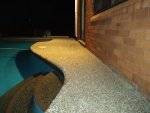
This is my pool. It's a standard chlorine pool, plaster over concrete construction, about 75,000 litres (20,000 gal I think - I'm in Australia). I'm thinking of converting it to saltwater, however I've got a few concerns and was hoping for some advice.
1. I've heard that saltwater is not the best for plaster pools, but there seems to be mixed information on this. Any thoughts?
2. As you can see, the pool gets VERY close to the external wall of my brick house (that gap is about 60cm/2 feet at its narrowest) and I'm worried I may get salt ingress and therefore damage to my brickwork. Note, the pool deck is ABOVE the damp course as the wall extends below the pebblecrete surface you can see here (there is a crawl space between the pool and the house). Does anyone think this could be a problem? Would it be worse than exposure to the water from a normal chlorine pool? If so, it there anything I could do to alleviate this issue?
Any advice or information would be very much appreciated!


